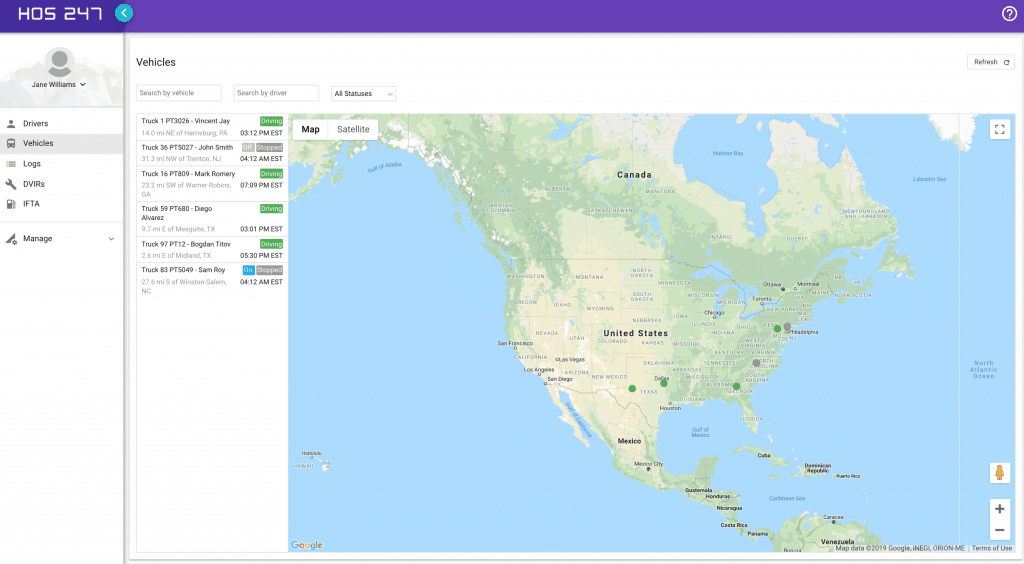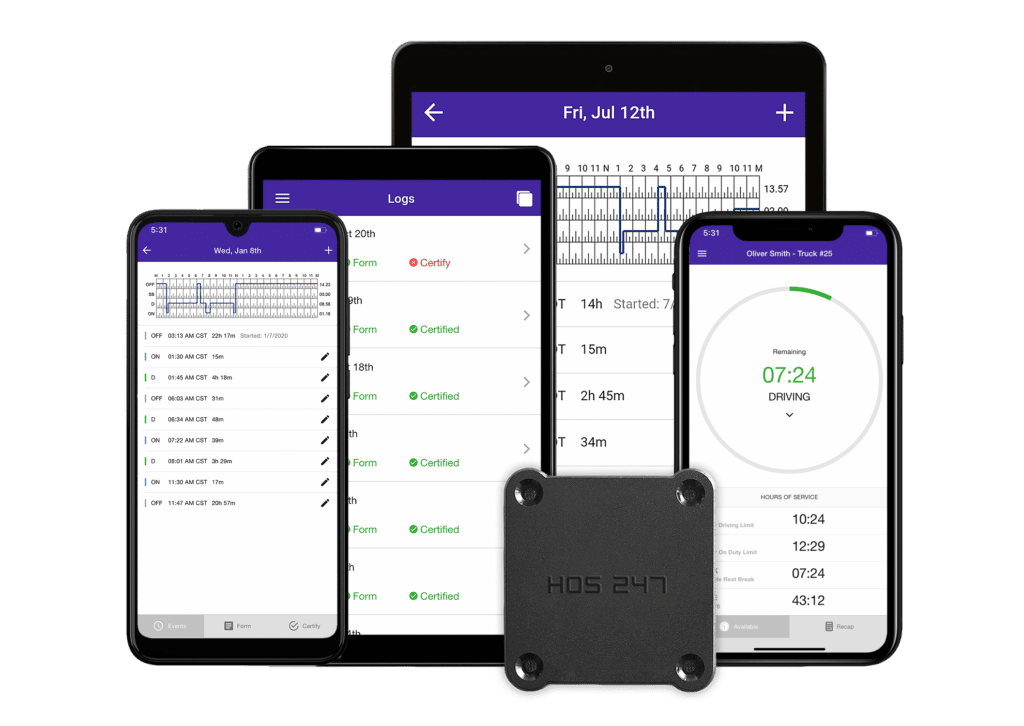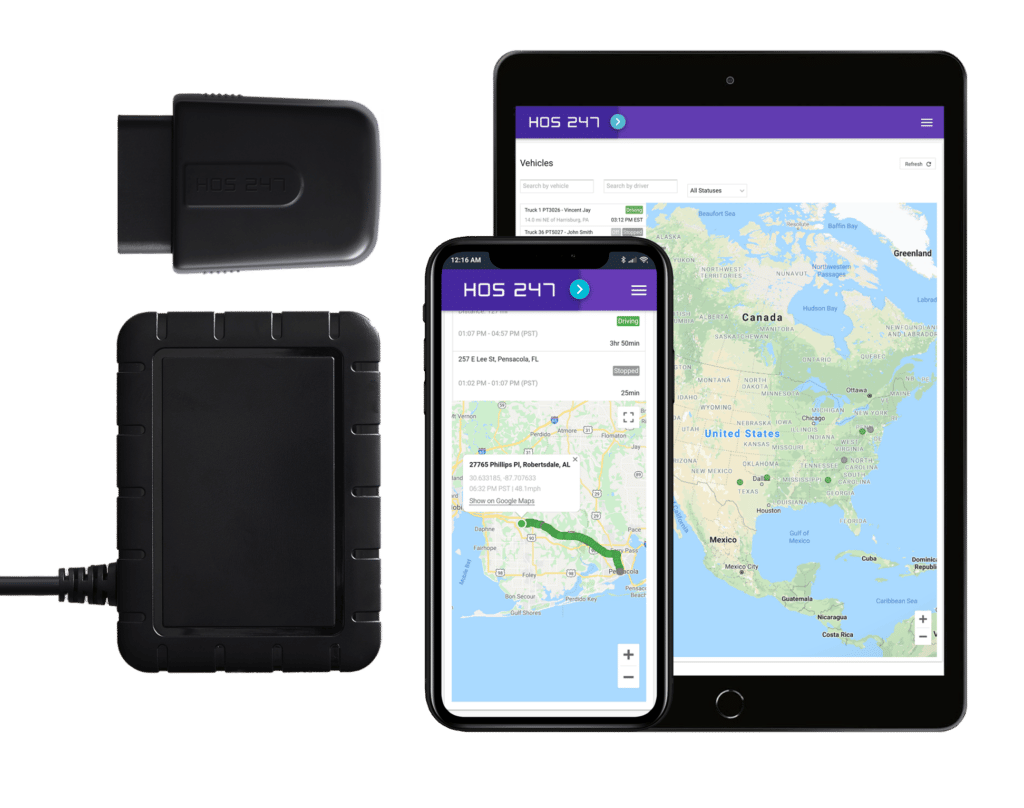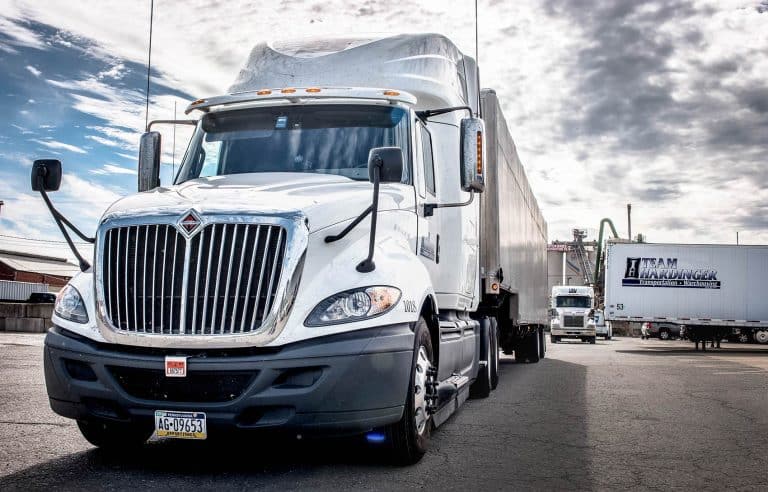The trucking industry continues to evolve, with technology playing a pivotal role in shaping fleet operations. What was once an optional tool has now become a critical component of business success, offering solutions that go beyond basic vehicle tracking.
Fleet management systems now integrate GPS tracking, ELD compliance, automated reporting, maintenance scheduling, and driver performance monitoring into a single, accessible platform. With 4G and 5G networks enabling real-time data transmission, fleet managers can make swift operational adjustments that improve efficiency and enhance profitability.
For companies managing commercial motor vehicles, staying ahead of fleet management technology is essential to maintaining a competitive edge. Modern systems help ensure compliance, optimize routes, reduce fuel costs, improve driver retention, and enhance customer service—key factors that directly impact profitability in the transportation sector.
This guide explores the evolution of fleet management technology, the benefits it offers, and the strategies companies can use to select the best solutions for their specific operational needs. Whether managing a small delivery fleet or a multi-state trucking operation, today’s advanced systems provide the visibility, control, and data-driven insights needed for smarter decision-making.
Do you have any questions? Talk to ELD Advisor: 650-405-3372 or Request Callback
The Evolution of Fleet Management Technology
Fleet management has changed dramatically in recent decades. What once involved paper records and basic dispatch systems has become digital platforms that make fleet operations much easier.
Before digital systems, fleet managers used paper to track driving hours, maintenance schedules, and routes. Drivers filled out paper logbooks, which often led to errors and wasted time. Dispatchers used wall maps and phone calls to coordinate trucks, while maintenance records were kept in filing cabinets.
GPS technology in the 1990s was the first big change, allowing basic tracking of vehicles. As cell networks improved from 2G to 3G, fleet systems started using more data, though they were still limited by slow networks.
Today’s 4G/LTE and new 5G networks have greatly improved commercial management. Modern systems now offer:
- Automatic compliance tracking for electronic logs and vehicle inspections.
- Real-time engine monitoring with early warning for maintenance needs.
- Better route planning that considers traffic, weather, and delivery times.
- Fuel use tracking including idle time monitoring.
- Driver performance measurement with coaching tools.
- Connection to other business systems like accounting and inventory.
More companies are using these technologies now. While big fleets adopted them first, lower costs and easier-to-use systems have made them available to fleets of all sizes. The ELD mandate pushed many companies to adopt digital systems that both meet regulations and improve overall fleet management.

The industry is now moving toward all-in-one systems that combine multiple functions in one platform. This makes technology simpler to use while giving fleet managers better information for making decisions.
Advantages of Using Modern Vehicle Fleet Management Technology
Having a fleet management plan means thoughtfully considering how tools, applications and practices work together for optimal productivity and profitability. Modern fleet systems combine multiple technologies into unified platforms that address daily operational challenges while delivering measurable returns. Companies that implement comprehensive fleet management solutions experience the following benefits:
- Lower maintenance and insurance costs. Digital vehicle inspection reports ensure maintenance needs are documented and addressed promptly, reducing major repairs while creating maintenance records that can help negotiate better insurance rates.
- Greater control over vehicles and drivers. Systems track driving behaviors like harsh braking and speeding, enabling managers to coach drivers who show risky patterns before accidents happen and prevent unauthorized vehicle use.
- Improved productivity. Digital recordkeeping replaces paper logs and manual documentation, saving office staff time while automated routing helps drivers avoid traffic delays and meet delivery schedules.
- Reduced fuel costs. Real-time monitoring identifies vehicles using excessive fuel while idling, and route optimization ensures the shortest paths between stops, significantly lowering overall fuel consumption.
- On-time delivery performance. GPS tracking combined with traffic-aware routing helps drivers meet customer expectations consistently, improving service reliability and customer satisfaction.
- Real-time vehicle tracking. Dispatchers gain complete visibility into fleet location and status, allowing for dynamic adjustments to schedules and assignments as conditions change throughout the day.
- Fewer accidents. Monitoring driver performance leads to safer driving habits through targeted coaching and recognition programs, reducing accident rates and associated costs.
- Data-driven decision making. Fleet managers no longer rely on guesswork—they use actual performance metrics shown in easy-to-read dashboards to identify operational trends and align transportation activities with company goals.
The high-performing transportation companies know that investing in comprehensive fleet technology is worth the effort because these integrated systems make vehicle fleet tracking easier while ensuring compliance with the transportation industry’s strict regulations.

The Importance of an ELD integrated Vehicle Fleet Management
The purpose of companies having a fleet management plan is to ensure their fleet is operating smoothly, while also looking for ways to improve performance, keep operating costs low and remain compliant with FMCSA regulations.
Before the implementation of electronic logging devices, compliance procedures were completed manually with paper logs. Once ELDs came into the picture, companies realized that it wasn’t just logging hours of service or records of duty status made easier; it was also other operational features that they hadn’t anticipated. Choosing the right ELD provider helped them not only comply with the FMCSA’s ELD mandate, but also helped them be more productive and compliant, thus avoiding hefty fines and keeping their drivers from being placed out of service.
Driver Experience and Retention
Keeping drivers is a big challenge for trucking companies. With qualified drivers hard to find, companies need to think about how their systems affect drivers’ daily work. New fleet technology can help make drivers happier and more likely to stay.
Improving Driver Satisfaction
Fleet systems make drivers happier by automating logbooks and cutting paperwork. Instead of filling out forms during off-duty time, drivers can rest or do personal activities. These systems also offer:
- Easy communication between office staff and drivers.
- Fair performance tracking.
- More driving time with less paperwork.
- Better routes to avoid traffic.
With GPS tracking and messaging, dispatchers can update drivers about route changes without constant phone calls. This helps drivers stay informed while working independently.
Reducing Paperwork
Automation does more than just track hours. Modern systems make vehicle inspections, fuel tracking, and trip documentation easier. Mobile apps let drivers quickly submit delivery receipts or inspection results, eliminating paper records and preventing lost documents that could delay pay.
Training Drivers Effectively
Introducing new technology requires good driver training. Many experienced drivers may resist new systems. Good training should show how the technology helps drivers, not just the company, and give hands-on practice with the actual devices.
Including experienced drivers in testing new systems can improve acceptance. Their feedback helps find usability problems and shows that the company values their input.
By reducing paperwork and giving drivers better tools, modern fleet systems make the job more satisfying. When drivers can focus on driving instead of paperwork, they’re more likely to stay with their employer—helping companies build a stable workforce.
HOS247 Offers All-in-One Vehicle Fleet Management Software and Hardware to Improve Operations and Safety
Besides the general overall benefits to fleets, there are specific benefits of all-in-one vehicle fleet management software to help companies improve safety and make general operations more efficient. These benefits include:
- GPS fleet vehicle tracking. Real-time tracking allows fleet managers to accurately track each vehicle and use this location knowledge to effectively plan routes and match vehicles with the nearest driver. It also ensures hours-of-service compliance (optional) and reduces fuel consumption. A vehicle’s GPS coordinates are updated every 30 seconds (up to 2 minutes depending on settings) when their vehicle is moving. With these coordinates, a fleet manager can choose to track the vehicle’s current location or look at the vehicle’s recent path. Location data is saved and available for a review.
- IFTA mileage calculations. Manual IFTA fuel tax reporting is an administrative burden. In addition to the time it wastes, it also costs money to hire staff to do it. The HOS247 solution is programmed to calculate the distance traveled by jurisdiction. Fleet managers can easily create reports from the HOS247 dashboard for any date or range of dates.
- Vehicle maintenance. Without intuitive software solutions, vehicle maintenance tracking had to be done like all other processes: manually. This creates room for error and poses the risk of vehicles missing their scheduled maintenance (and putting driver safety on the back burner). With HOS247 solutions, fleet managers can easily keep track of:
- Oil changes.
- Warranty expiration dates.
- Tire rotation schedules.
- License renewals.
- Preventive maintenance.
In addition, the maintenance features also make it easy to:
-
- Input schedules for servicing every vehicle in the fleet based on hours of usage, mileage or preset dates.
- Access records of past service history.
- Schedule reminders for upcoming services.
- Automated idle tracking. Excessive idling by drivers can equate to high fuel costs. By using HOS247’s automated idle tracking features, fleet managers can access idling and utilization rates from their dashboard. This can either be viewed per vehicle or driver, or for their entire fleet. Being proactive and preventing excessive idling can equate to major cost savings, as these reports help fleet managers identify drivers who are idling excessively. In turn, they can train these drivers on how to prevent idling and reward the ones who don’t.
- ELDs. Even though electronic logging devices are intended to record hours-of-service and records-of-duty status for FMCSA and DOT compliance, they offer many more benefits as long as you choose the right ELD provider. HOS247 ELDs help:
- Avoid hours-of-service violations by providing accurate, automated calculations and alerts.
- Seamlessly manage and edit driver logs.
- Easily manage and edit driver vehicle inspection reports.
- Access support on the road for help 7 days a week with software and compliance issues.
- Train drivers how to keep accurate e-logs via over the phone onboarding.
- Help drivers pass DOT inspections.
HOS247 delivers reliable, user-friendly fleet management solutions with multilingual support available seven days a week. With flexible no-contract options and a two-week trial period, transportation companies can experience firsthand how the right technology partner transforms fleet operations and drives business growth.

Choosing the Right Fleet Management Provider
Picking the right fleet management provider affects your operation’s efficiency, compliance, and profits. With many companies offering similar services, fleet managers need a clear strategy to find the best fit.
When comparing providers, focus on these key factors:
- Industry experience. Providers who know transportation understand trucking rules and challenges better.
- System reliability. Look for solutions that rarely go down and have backups when problems occur.
- Hardware toughness. Trucking equipment faces rough conditions. Devices should handle vibration, extreme temperatures, and rough use.
- Ease of use. Systems that are hard to use will face resistance. Simple interfaces reduce training time.
- Support quality. Check the availability and knowledge of the support team, especially for 24/7 operations.
- Integration abilities. The system should work with your existing business software.
- Room to grow. Your business might expand, and your fleet system should handle growth without replacement.
- Update policies. Regular software updates keep the system current with rule changes.
Questions to Ask Providers
When meeting potential providers, ask specific questions:
“How does your system handle ELD compliance requirements?”
They should clearly understand current regulations.
“What is your approach to customer support?”
Look for multiple language options, weekend help, and direct access to knowledgeable staff.
“Can you provide references from fleets like ours?”
Talking to current customers gives insights into real system performance.
“How are software updates handled?”
Understand if updates are automatic and if they cost extra.
“What security measures protect our fleet data?”
Providers should have strong data protection.
Total Cost Analysis
The upfront price rarely shows the whole picture. A complete cost analysis should include:
- Initial hardware costs and installation fees.
- Monthly subscription fees.
- Training expenses.
- Potential maintenance costs.
- Integration expenses with existing systems.
- Costs of extra features.
The cheapest provider isn’t always the best value. Consider savings from improved efficiency, fewer violations, better fuel management, and driver retention.
Implementation Timeline
Realistic timelines help ensure a smooth transition. Most implementations follow this pattern:
- Planning (1-2 weeks): Defining needs and preparing.
- Initial setup (1-2 weeks): Installing hardware and setting up software.
- Training (1-2 weeks): Teaching drivers and staff how to use the system.
- Trial period (2-4 weeks): Testing with some vehicles before full rollout.
- Full deployment (varies by fleet size): Installing in all vehicles.
- Optimization (ongoing): Improving processes and using advanced features.
Providers promising unusually fast setup may skip important steps. A careful approach usually works better than rushing.
Do you have any questions? Talk to ELD Advisor: 650-405-3372 or Request Callback
Future Trends in Fleet Technology
Fleet management is rapidly evolving, and staying ahead requires adopting new technologies, preparing for regulatory changes, and embracing sustainability initiatives. Artificial intelligence is improving data analysis and predicting maintenance needs, while vehicle-to-everything (V2X) communication enhances safety and traffic coordination. Advanced driver assistance systems (ADAS) help reduce driver fatigue, and warehouse integration allows for greater supply chain visibility.
Regulatory updates also play a crucial role in fleet operations. FMCSA changes to ELD requirements and cross-border compliance considerations require careful monitoring to ensure adherence to industry standards.
Sustainability is another key focus, with fleets increasingly turning to electric vehicle (EV) management solutions and route optimization strategies to reduce emissions and fuel consumption. By staying informed and proactive, fleet managers can leverage these advancements to improve efficiency, compliance, and long-term profitability.
Conclusion
Modern fleet management technology has evolved into a comprehensive tool for compliance, efficiency, and profitability. Choosing the right system requires careful vendor evaluation, cost analysis, and implementation planning. AI, connectivity, and sustainability will drive future advancements, making adaptable solutions essential.
HOS247 offers a reliable, user-friendly fleet management platform with multilingual support and a two-week trial. Investing in the right technology today ensures long-term success in an evolving industry.

I’ve co-founded, built and managed several transportation-related businesses. Now, I’m a founder and CEO of HOS247 – an AI Transportation Platform for trucking companies, freight brokers and other logistics operations. We are transitioning old-style operations to technology-advanced logistics entities and help them to grow their businesses. ELDs (electronic logging devices), fleet tracking and management 2.0 combined with AI-powered dispatch tools.












To comply with federal legislation, trucking businesses must equip their vehicles with electronic logbooks to keep hours-of-service records. Carriers should check for their provider’s name on the FMCSA ELD approved list to ensure their time and money are well invested.

In the world of commercial trucking, staying on top of regulations is key to smooth operations. The electronic logging device (ELD) mandate, enforced by the Federal Motor Carrier Safety Administration (FMCSA), has reshaped how drivers and carriers track hours of

The transportation industry has changed dramatically with the ELD (electronic logging device) mandate. For truckers and fleet owners, electronic logging devices are no longer just about compliance – they’re tools that can help run a smarter, more profitable operation. But